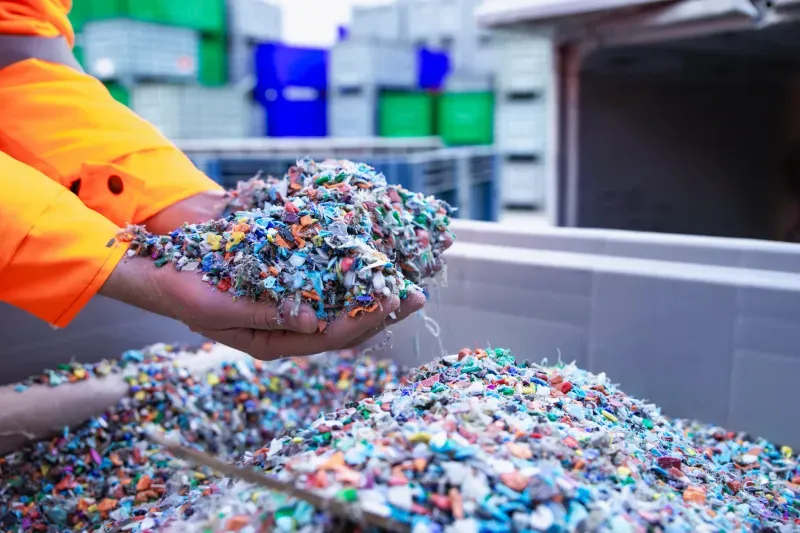Over the years, both the volume and complexity of recycling have continued to increase due to modern packaging and materials. Outdated facilities, or a complete lack thereof, as well as inconsistent processing capabilities, have pushed a lot of recyclable materials into landfills.
The Cultivating Investment in Recycling and Circular Local Economies Act of 2025—better known as the CIRCLE Act—seeks to change that. Introduced on July 16, 2025 by Representatives Tom Suozzi (D-N.Y.) and Brian Fitzpatrick (R-Pa.), this bipartisan bill creates new incentives for both the public and private sectors to invest in advanced recycling infrastructure.
What Is the CIRCLE Act?
The CIRCLE Act is designed to accelerate investment in the systems and technology needed to process recyclable materials more efficiently and at a greater scale.
At its core, the bill offers a 30% investment tax credit for qualifying purchases of recycling equipment and infrastructure. This incentive is intended to reduce the upfront financial burden for companies and local governments looking to upgrade or expand their recycling capabilities.
Because local governments don’t pay federal income taxes, the bill includes a direct rebate for municipalities equal to the value of the tax credit. This ensures that cities, counties, and other local entities can take advantage of the same financial support as private companies.
Key Features of the Bill
- 30% Investment Tax Credit (Over 10 Years)
By investing in eligible recycling property, businesses are able to deduct 30% of the investment cost through a federal tax credit.
- Equal Access for Local Governments
Municipalities making similar investments would receive a direct rebate equal to the credit, ensuring that the public sector of recycling programs can benefit alongside private industry.
- Covered Technologies
Includes a wide range of recycling-related equipment and software, enabling facilities to process more materials and higher-quality recycled content.
- Long-Term Implementation
The bill is structured for a 10-year phased rollout, giving stakeholders the ability to plan, secure funding, and gradually scale their improvements.
Why The CIRCLE Act Matters & Its Projected Impact
According to a study done by the Sustainable Packaging Coalition, only a little over half of all US citizens have total access to curbside recycling programs. This percentage decreases more as materials and packaging get more complex. By lowering the cost of upgrading facilities, the CIRCLE Act could significantly expand processing capabilities across the country.
Better recycling infrastructure also means higher-quality recycled materials available for U.S. manufacturers. This supports domestic supply chain resilience, reduces reliance on imported virgin materials, and helps companies meet recycled content goals. From job creation coming out of new facilities to waste diversion and more effective sorting processes, this act aims to benefit many different stakeholders.
Navigating the CIRCLE Act With Specification Data
Investing in processes that align with the CIRCLE Act can have a measurable impact on how much packaging is truly recycled—not just labeled as recyclable. By leveraging up-to-date packaging specifications, companies can better assess and report the real-world recyclability of their products.
As recycling infrastructure improves and expands, the types and total volume of materials recycled are expected to grow. This creates more opportunities for companies to design packaging that can be recovered and reprocessed.
Specification Data Management platforms (SDM) —such as Specright—allow businesses to track the recyclability of their packaging at the component level, ensuring designs meet both technical requirements and infrastructure capabilities.
When stronger recycling infrastructure is paired with clear, accurate specifications, it creates a powerful feedback loop: more materials get recycled, more high-quality recyclable raw materials enter the market, and brands can confidently design packaging that supports a circular economy.
The Road to a Stronger Recycling Future
The CIRCLE Act offers a bipartisan approach to solving a very persistent waste challenge within the US today. By providing long-term, scalable incentives for recycling investment, both businesses and local governments are given a clear path toward modernizing infrastructure, supporting domestic manufacturing, and reducing environmental impact. If the bill is passed, it could change how recycling is done in the US. moving us closer to a truly circular economy.
To learn more about how Specright can help you get your sustainability initiatives across the finish line, check out our sustainable packaging page or request a demo today.
Explore More Blogs
Get Started
With Specright’s Solution Suite, you can digitize, centralize, and link your specification data to drive efficiencies, intelligence, traceability, and collaboration within your organization and across your supply chain network.




